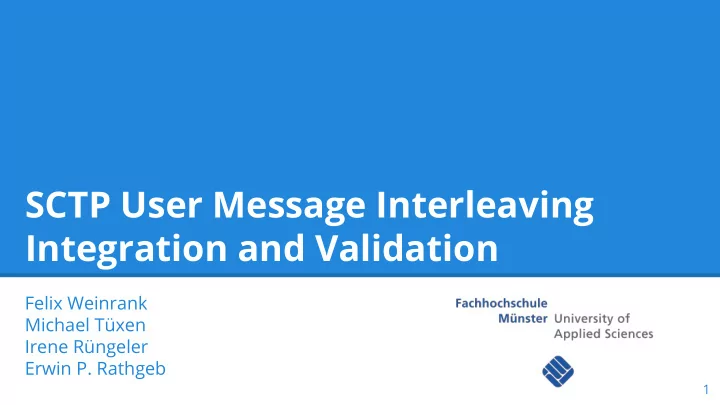

SCTP User Message Interleaving Integration and Validation Felix Weinrank Michael Tüxen Irene Rüngeler Erwin P. Rathgeb 1
Outline ● Brief introduction to SCTP ● Message interleaving and stream scheduler ● Integration and validation ● Measurements and results ● Outlook and future work 2
SCTP Overview Stream Control Transmission Protocol ● Layer 4 protocol like TCP/UDP ● Message oriented and multihomed ● Originally designed for small messages ● Used for WebRTC data channels association streams 3
Interleaving and Scheduling 4
Interleaving - why? Sender side Head-of-line Blocking ● A large SCTP user message blocks all other messages in any stream until completely sent Message interleaving ● Reduces Head-of-line Blocking ● Specified by IETF draft * *https://tools.ietf.org/html/draft-ietf-tsvwg-sctp-ndata-07 5
Data transfer - non-interleaving 1. Stream scheduler selects stream 2. Optional message fragmentation 3. Stream scheduler keeps locked on stream until all fragments of a single message have been sent 6
Data transfer - non-interleaving 1. Stream scheduler selects stream 2. Optional message fragmentation 3. Stream scheduler keeps locked on stream until all fragments of a single message have been sent Example: WebRTC chat application Head-of-line Blocking - File transfer blocks chat messages 7
Data transfer - interleaving 1. Stream scheduler selects stream 2. Optional message fragmentation 3. Stream scheduler selects next stream 8
Integration and Validation 9
Integration ● Integration follows IETF draft ● iData parameter enables interleaving support ● Interleaving is used if both peers announce the extension support in the 4-way-handshake 10
Validation Wireshark ● Packet flow inspection ● I-Data support added Packetdrill ● Script based testing tool for transport protocols ● Currently more than 120 interleaving specific tests ● Same tests for OMNeT++/INET and FreeBSD 11
Validation External Interface ● Interoperability tests between FreeBSD’s SCTP implementation and OMNeT++/INET model 12
Measurements - scenario Bottleneck scenario ● SCTP server and client ● Random UDP background traffic 13
Measurements - scenario Two competing streams ● Stream 1 ○ Saturated ○ Large messages (1 - 128kB) ○ Low priority ● Stream 2 ○ Unsaturated ○ Small messages (8 - 16B) ○ High priority 14
Measurements - results 15
Conclusion and Outlook 16
Conclusion Conclusion ● Message interleaving reduces head-of-line-blocking for fragmented messages ● Wireshark, Packetdrill and the external interface are great tools to validate protocol operation Outlook ● Buffering improvements ● New stream schedulers (e.g. weighted-fair-queueing) 17
Recommend
More recommend